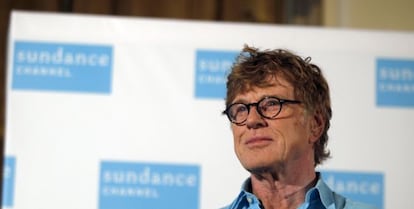“I have a special affection for Spain”
Robert Redford promotes the TV offshoot of his Sundance festival in Madrid

The first thing Robert Redford does after greeting us with a warm handshake is to take an interest in who the journalist about to interview him is, proceeding to use given names throughout the entire meeting: “How are you?” “Where did you learn English?” The acting legend and filmmaker proves to be just as captivating a heart-throb as you’d expect, a hardened master in the art of the one-on-one. Relaxed, cordial and looking particularly charming for his 76 years, he was in Madrid this week to promote the Sundance Channel — available on Telefónica’s Imagenio package, channel 46 — the TV offshoot of his Sundance Film Festival. Though it has been available in Spain since 2011 — and in the US since 1996 — Redford wanted to “celebrate” its expansion not just here, but into other countries across the globe.
“In part, the reason for coming to Spain is because I have a special affection for it,” he says, sat lazily on a couch in his suite in Madrid’s Ritz Hotel. “I spent time here (in the 1950s and 1960s) as an actor, but not in Madrid, rather in the south, in Mijas and in Mallorca. I was here three times, so I feel a personal attachment.”
The movie star, filmmaker, and two-time Oscar winner — as director of Ordinary People in 1981 and as the recipient of a lifetime achievement prize in 2002 — says he is relatively up to date with the situation the country is going through. “It is very sad,” he blurts out when asked his opinion about the Spanish government’s cuts to culture funding.
“I think subsidizing the arts is very beneficial, because it creates masses of new jobs and opportunities that allow artists to develop their work. Unfortunately, it isn’t done in the United States, which seems madness to me. You have to do everything yourself, and that is exactly how I started Sundance.”
Founded in 1978, the festival, which bears the name of the character he played in Butch Cassidy and the Sundance Kid, the classic 1969 western in which he starred alongside Paul Newman, has since then devoted itself to supporting and promoting independent film and theater.
The Sundance Channel has the same aim: to show and promote movies made outside the commercial circuits, though on the small screen. “When I was young the television was this tiny,” he explains, drawing a square with his hands, “nine inches. Now televisions are getting bigger all the time, they are gigantic. The difference with cinema is that the TV allows you to have a more intimate experience, in your own space. Even though I also like to feel the energy of the people in the theater. Both formats work.”
As artistic director of the channel, which as well as indie movies also offers TV series, documentaries and special content, Redford is involved in everything related to the hunt for programming ideas. “For example, it occurred to me that we might tell the story of a waiter in a documentary, or another about women in wheelchairs. Seeing these women might be depressing, but what about if they are full of life and personality and we transcend the fact that they go around in wheelchairs? Those are the kind of ideas I bring.”
Redford has just acted in, produced and directed the thriller The Company You Keep, set to be released in Spain next year. But throughout the conversation, which is led by the mellifluous rhythm of his accent, the star of movies such as The Sting and Out of Africa repeatedly emphasizes and provides examples of the importance of the documentary genre.
“I think that, in the US at least, journalism has become something very biased,” he says.
“You have Fox News and other stations that have a very conservative point of view, and broadcast that stance, that limited point of view. And that means that another channel has to launch a liberal point of view, so in the end it is all divided. And then you have the internet, with all those channels for broadcasting personal opinions. And like that, how is anyone going to know what the truth is? Documentaries, as they take their time, can dig deeper, and when you watch them you get the feeling that they are telling you the truth, or at least something more truthful than what you see on the news.”
Tu suscripción se está usando en otro dispositivo
¿Quieres añadir otro usuario a tu suscripción?
Si continúas leyendo en este dispositivo, no se podrá leer en el otro.
FlechaTu suscripción se está usando en otro dispositivo y solo puedes acceder a EL PAÍS desde un dispositivo a la vez.
Si quieres compartir tu cuenta, cambia tu suscripción a la modalidad Premium, así podrás añadir otro usuario. Cada uno accederá con su propia cuenta de email, lo que os permitirá personalizar vuestra experiencia en EL PAÍS.
¿Tienes una suscripción de empresa? Accede aquí para contratar más cuentas.
En el caso de no saber quién está usando tu cuenta, te recomendamos cambiar tu contraseña aquí.
Si decides continuar compartiendo tu cuenta, este mensaje se mostrará en tu dispositivo y en el de la otra persona que está usando tu cuenta de forma indefinida, afectando a tu experiencia de lectura. Puedes consultar aquí los términos y condiciones de la suscripción digital.









































